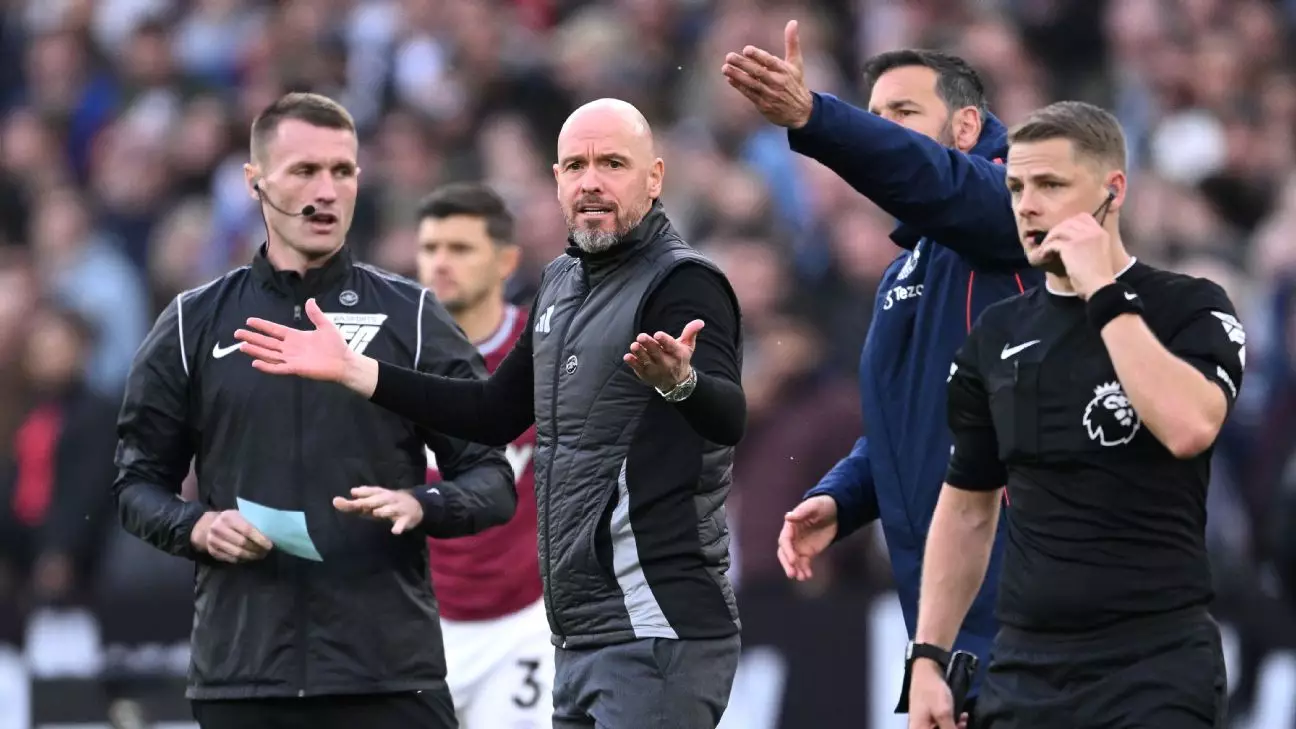In recent times, the introduction of Video Assistant Referee (VAR) technology has brought an array of complexities and controversies to the world of football. The case of West Ham United’s controversial penalty against Manchester United on October 27 serves as a stark reminder of the frailties inherent within the VAR system. Howard Webb, the Premier League’s chief refereeing officer, opened up about this significant error, revealing how a misjudgment in evaluating the play ultimately led to an upheaval in management at United and sparked widespread debate about the reliability of VAR.
The incident occurred during a tightly contested match, with the score at 1-1 as tensions heightened in the dying minutes. A challenge involving Matthijs de Ligt and Danny Ings prompted VAR intervention, leading to an unexpected penalty call that allowed West Ham to snatch a late victory. This critical moment not only hindered Manchester United’s performance but also sealed the fate of their beleaguered manager Erik ten Hag, who was dismissed shortly thereafter, reflecting the broader implications such decisions can have on the management and morale within clubs.
Webb’s reflections shed light on the thought process of VAR officials, revealing a potential overemphasis on a specific aspect of the play that ultimately clouded their judgment. The commentator’s introspection highlights how the VAR’s focus on de Ligt’s leg—rather than the broader context of whether a foul occurred—led to a flawed assessment of the situation. Webb articulated that the leg was “not making any contact with the ball,” suggesting that the VAR team misinterpreted the incident as a clear foul when, by his standards, it should have been recognized as a play on.
This raises significant questions regarding the criteria that govern VAR interventions. Webb’s assertion that there should be a bar high enough to warrant a review implies that such pivotal decisions require a more robust framework to avoid undermining the integrity of the game. This is particularly relevant given how narrowly decisive events like penalties can influence match results and, consequently, team fortunes.
The fallout from the VAR decision significantly impacted Manchester United, culminating in the dismissal of tentatively positioned manager Erik ten Hag. Under immense pressure due to the club’s poor performance, this incident was the catalyst for a regime change, which has since seen Sporting CP’s Ruben Amorim take the reins. It brings to light the question of accountability, where the repercussions of a referee or VAR officiating mistake reverberate beyond a single match and reshape the trajectory of clubs.
This narrative isn’t an isolated incident; it is reflective of the increasing stakes tethered to officiating decisions in modern football. Managers and players now work within systems where VAR errors can alter lineups, strategies, and the entire climate of pressure surrounding club performance. Ten Hag’s firing can serve as a case study on how refereeing decisions impact management structures and, therefore, the very essence of football clubs.
While VAR was introduced with the noble aim of refining officiating accuracy and fairness, its application has not been without criticism. Webb’s additional commentary on another controversial incident involving Arsenal’s William Saliba further solidifies the notion that VAR must balance its interpretative flexibility with a standard that ensures consistency. Webb described how an incorrect yellow card, compounded with VAR’s recommendation for a red, demonstrated VAR’s capacity to correct on-field mistakes—albeit with significant confusion in execution.
Contrasting this with the current season’s identified VAR errors—including a disallowed goal for AFC Bournemouth and the controversial handling of Bruno Fernandes’ actions—highlights the inconsistency plaguing VAR’s implementation. While last season’s tally was alarmingly high, this season’s figure of three errors thus far suggests a possible uptick in awareness and scrutiny from the VAR team. Nonetheless, fans and analysts remain cautious, as even a minor inconsistency can impose a significant impact on the league’s competitive integrity.
As the conversation surrounding VAR continues to evolve, it is essential that stakeholders—including clubs, officials, and governing bodies—collaborate to refine its operational framework. Transparency in decision-making processes, coupled with continuous education for referees and VAR officials, could enhance the consistency and reliability of officiating. The goal should be to foster an environment where the merits of the game are upheld and where technology enhances rather than detracts from the matchday experience.
Ultimately, the VAR discourse opens a broader dialogue about accountability in football. As technology becomes entrenched in the sport, a robust governance structure that allows for adjudication errors and their consequences will be crucial in maintaining the game’s integrity. The challenge moving forward will be to reconcile the emotional investment fans and clubs have in outcomes with a systematic approach that embraces the potential of technology while safeguarding the spirit of the game.

